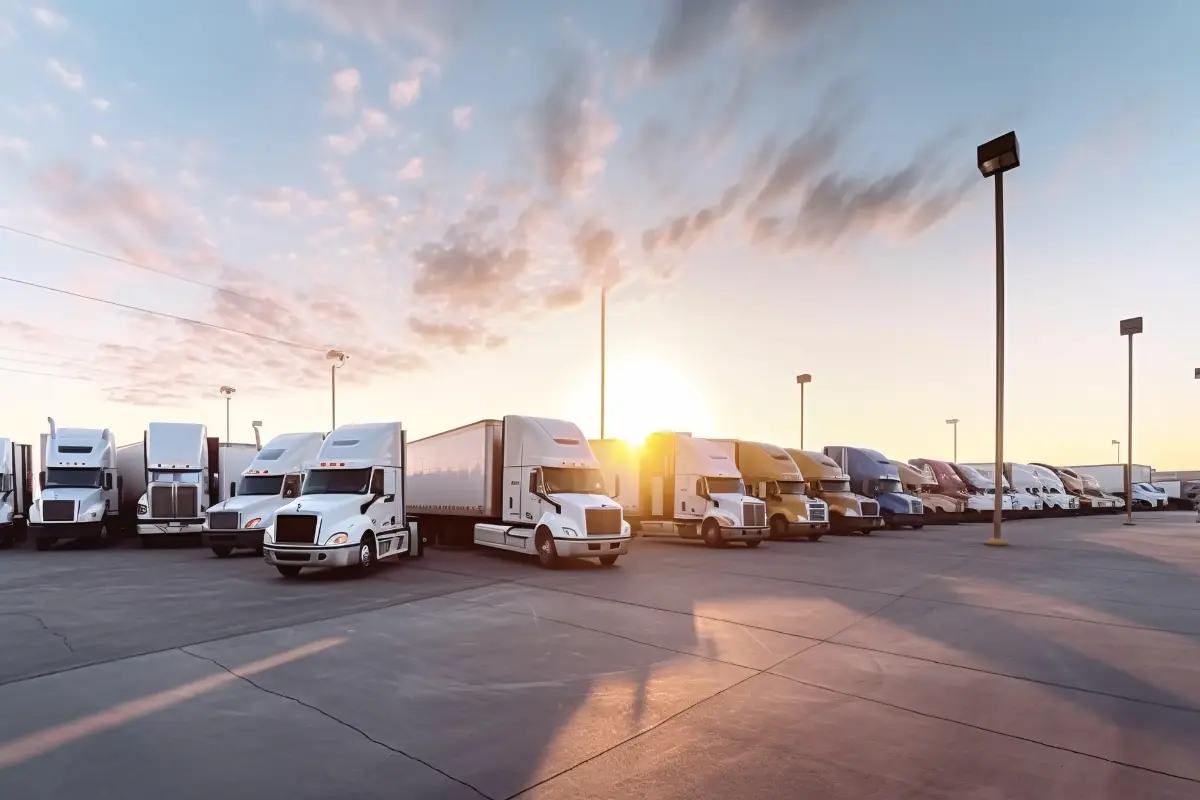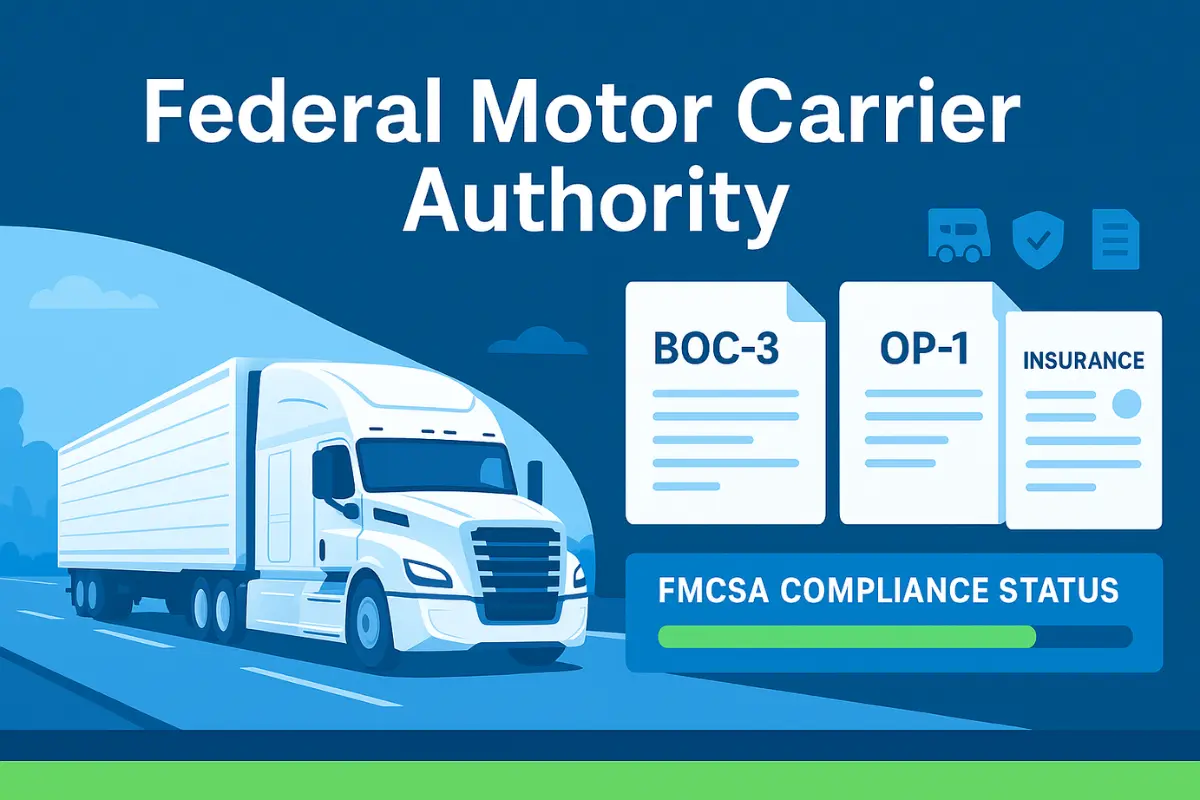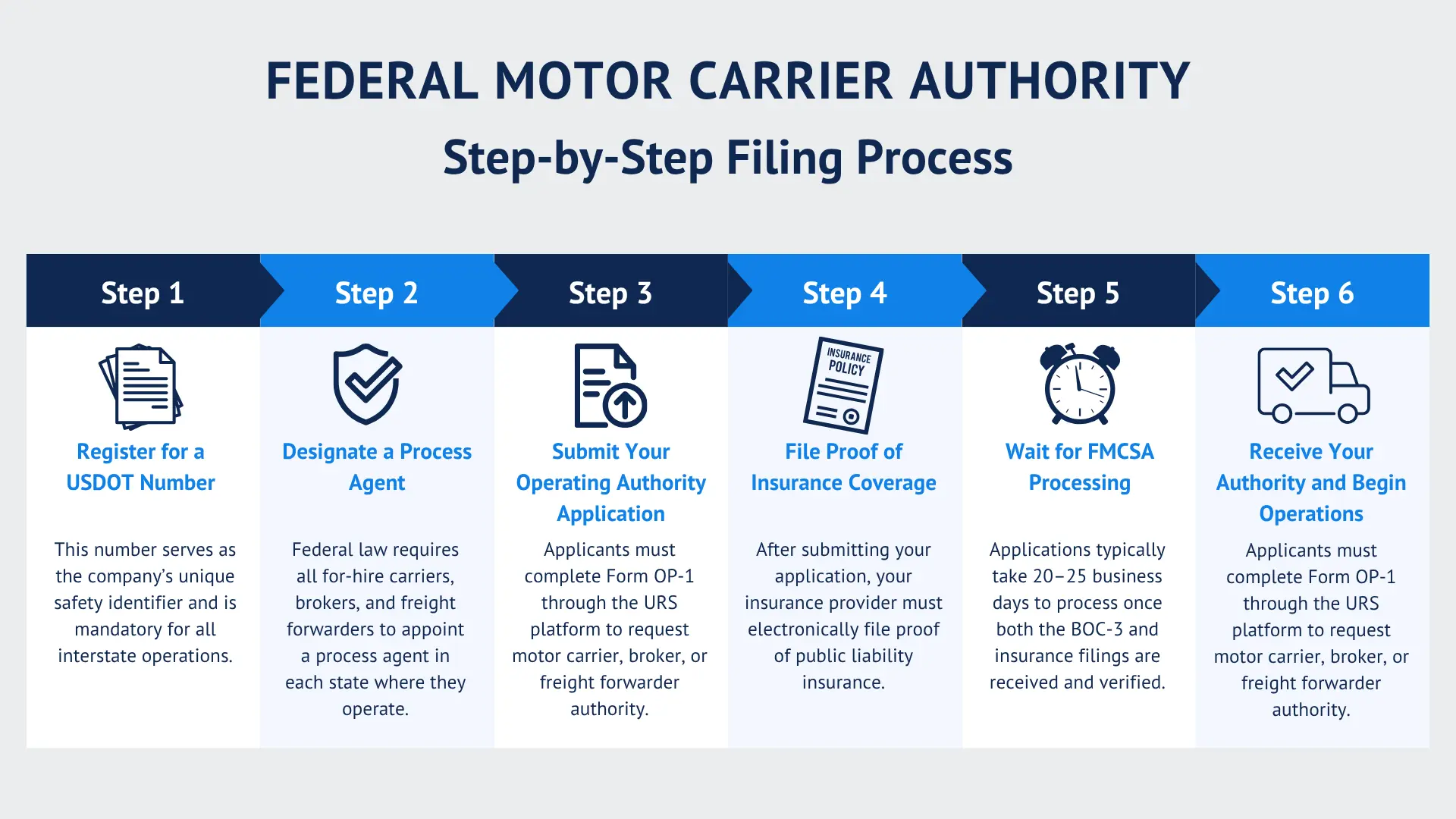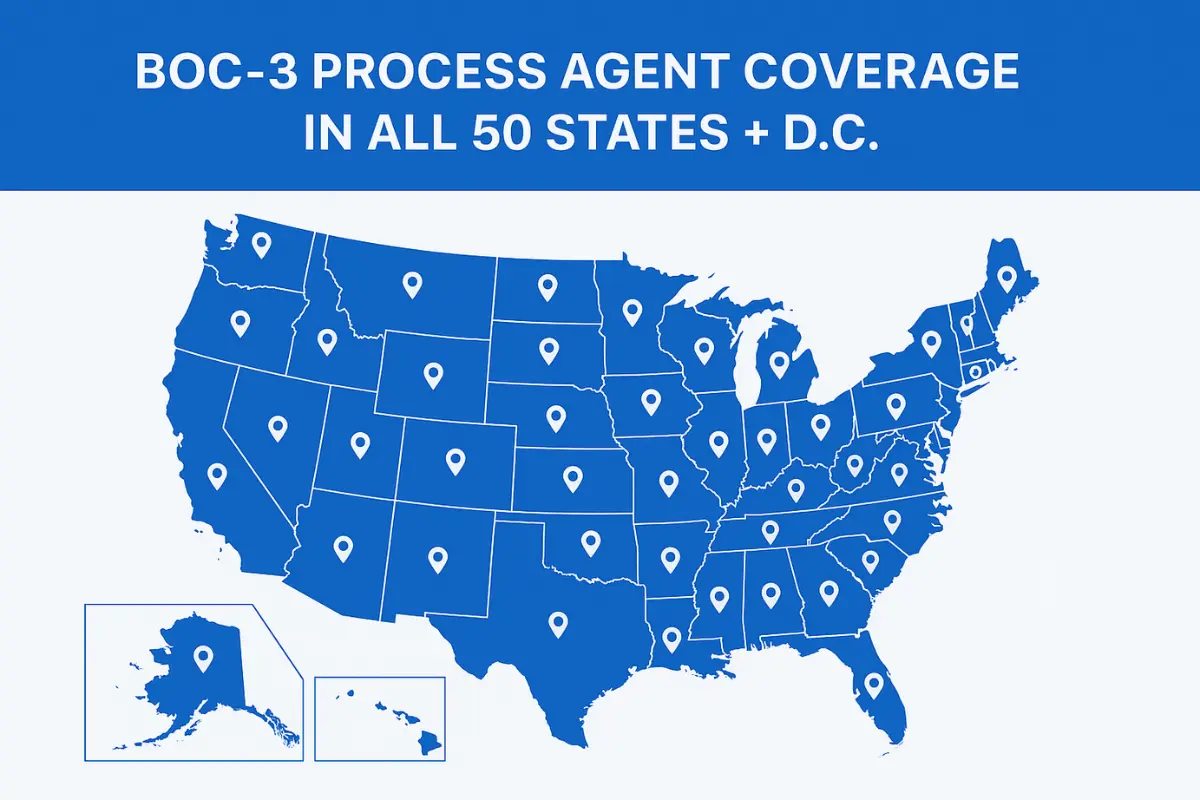Understanding Federal Motor Carrier Authority Filings: A Comprehensive Guide

What if missing one crucial filing could shut down your trucking operation overnight and expose you to thousands in fines? Every year, trucking companies lose operating authority because they don't understand the federal filing requirements.
In this guide we'll walk you through everything you need to know about federal motor carrier authority filings so you can avoid costly mistakes and keep your trucks moving legally.

Key Takeaways
-
Federal motor carrier authority filings establish your legal right to operate commercial vehicles in interstate commerce. The FMCSA requires specific authority types depending on whether you transport goods, broker shipments, or provide freight forwarding services.
-
FMCSA has proposed phasing out MC numbers in a future release of its modernized registration system, under which the USDOT number would serve as the primary identifier with suffixes for registration types (e.g., motor carrier, broker, freight forwarder). This change is not yet in effect and will not roll out in the first release.
-
The Unified Registration System streamlines online filing, but proper execution matters. From designating process agents to filing insurance proof, every step must be completed correctly to avoid delays or authority suspension.
-
Motor carrier safety regulations govern ongoing operations—driver qualifications, hours of service, vehicle maintenance, and insurance requirements all demand continuous attention. Compliance directly impacts your safety rating, insurance costs, and ability to secure profitable freight contracts.
-
However, partnering with professional services eliminates the guesswork. Experts handle complex paperwork, ensure accuracy across all filings, maintain your process agent appointments nationwide, and prevent costly mistakes that could shut down your operation entirely.
What Are Federal Motor Carrier Authority Filings?
Federal motor carrier authority filings are the official applications and documentation submitted to the Federal Motor Carrier Safety Administration (FMCSA) to obtain legal permission to operate commercial vehicles in interstate commerce. These filings function like a federal business license for motor carriers—without the proper authority, operating across state lines is illegal under federal transportation law.
These filings establish a carrier’s official status within the federal transportation system and connect their registration to safety, insurance, and operating authority data. They are required because the federal government regulates interstate transportation to protect public safety, reduce fraud, and promote fair business practices across the commercial trucking industry.
Operating without legal FMCSA authority can lead to serious consequences. Carriers caught transporting goods in interstate commerce without valid registration can have their vehicles placed out of service, incur fines that may reach tens of thousands of dollars, and suffer business disruptions that jeopardize client contracts. These penalties highlight how critical it is for motor carriers to maintain compliance and ensure their federal filings are properly completed and updated.
Real-world example: James bought three trucks and started hauling freight between states without filing for authority. When stopped at a DOT inspection station, his lack of proper authority resulted in his trucks being placed out of service, thousands in fines, and delayed deliveries that cost him major client relationships.
Types of Motor Carrier Operating Authority
The FMCSA offers several authority types based on how you plan to operate. Choosing the correct authority ensures you can run your business legally and efficiently.
Motor Carrier of Property (except Household Goods)
This authority allows a for-hire motor carrier to transport goods other than household goods for payment. It applies to carriers hauling freight across state lines for the general public. These carriers must maintain proof of public liability insurance with the FMCSA before operating. Most freight carriers fall under this category because it provides flexibility to serve multiple customers without exclusive contracts.
Motor Carrier of Household Goods
This authority is specifically for moving companies that transport personal property and household items used in a home. Carriers with this authority must provide additional services such as packing, loading, and inventorying and must carry both public liability and cargo insurance. Household goods carriers often face more stringent regulatory oversight due to the consumer-focused nature of their business.
Broker Authority
Brokers do not operate trucks themselves. Instead, they arrange transportation between shippers and authorized carriers, serving as the intermediary in freight transactions. There are two types of broker authority:
-
Broker of Property (except Household Goods)
-
Broker of Household Goods
To operate legally, brokers must register with the FMCSA and maintain a surety bond or trust fund. This ensures that carriers are paid and shippers are protected against fraud. Acting as a broker requires strong industry connections and compliance with FMCSA financial accountability requirements.
FMCSA has proposed phasing out MC numbers in a future release of its modernized registration system, under which the USDOT number would serve as the primary identifier with suffixes for registration types (e.g., motor carrier, broker, freight forwarder). This change is not yet in effect and will not roll out in the first release.
Federal Motor Carrier Authority Online Filings
The Federal Motor Carrier Safety Administration (FMCSA) has streamlined the registration and authority application process through its online Unified Registration System (URS). The URS consolidates previously separate application forms into a single, digital system used by motor carriers, brokers, and freight forwarders to register, update records, and maintain compliance.
Step-by-Step Filing Process
Step 1: Register for a USDOT Number
All new applicants must first obtain a USDOT number. This number serves as the company’s unique safety identifier and is mandatory for all interstate operations.
Step 2: Designate a Process Agent
Federal law requires all for-hire carriers, brokers, and freight forwarders to appoint a process agent in each state where they operate. This is done through filing Form BOC-3, which must be submitted electronically by the designated process agent.
Step 3: Submit Your Operating Authority Application
Applicants must complete Form OP-1 through the URS platform to request motor carrier, broker, or freight forwarder authority. Each operating authority type requires a $300 filing fee, paid at the time of application.
Step 4: File Proof of Insurance Coverage
After submitting your application, your insurance provider must electronically file proof of public liability insurance (Forms BMC-91 or BMC-91X) with the FMCSA.
-
For-hire property carriers must maintain public liability insurance coverage.
-
Higher minimums may apply for certain hazardous materials or passenger transport operations.
-
Cargo insurance is not federally required, except for companies transporting household goods.
Step 5: Wait for FMCSA Processing
Applications typically take 20–25 business days to process once both the BOC-3 and insurance filings are received and verified. The FMCSA may request additional information if submissions are incomplete.
Step 6: Receive Your Authority and Begin Operations
Once approved and all filings are in place, the FMCSA activates your operating authority. Your USDOT number must then be displayed on both sides of every commercial motor vehicle used in interstate commerce.

Tips for Successful Online Applications
The Federal Motor Carrier Safety Administration (FMCSA) now requires all new applicants for interstate operating authority to register through the Unified Registration System (URS). This online platform integrates USDOT, insurance, and BOC‑3 filings into a single step-by-step process. Successful applicants avoid delays by following precise data entry and document submission requirements.
As Mark Schremmer from Overdrive Magazine explains, “Fast is slow and slow is fast. When we do things in haste, mistakes happen. Always review every entry for typos, accuracy, and duplications before submitting your FMCSA authority filings.”
Thoroughly verify that your company name, address, and business structure match across all accounts — including your USDOT Number, insurance, and BOC‑3 Designation of Process Agents forms. Any inconsistency can trigger application rejection or extended review.
Before filing, line up your liability insurance policy, since FMCSA will not activate your authority until both your insurance and BOC‑3 proof are received electronically. Keep organized records of submission confirmations, dates, and uploaded documents.
Finally, monitor your registration through your FMCSA Portal and avoid scheduling freight until your authority status shows as “Active.” Operating before official activation is a federal violation under 49 CFR Part 392.9a, and can result in immediate authority suspension.
Motor Carrier Safety Regulations
Obtaining federal motor carrier authority grants the right to operate, but maintaining that authority depends on full compliance with ongoing safety regulations enforced by the FMCSA. These standards are detailed in Title 49 CFR Parts 350–399, and cover every area of daily operations.
Overview of Key Regulations
Driver Qualifications: Carriers must maintain complete Driver Qualification (DQ) files for every driver, documenting license validity, employment history, medical certification, and pre‑employment drug and alcohol testing. As of June 2025, medical examiners must upload DOT physical exam results to FMCSA’s National Registry within 24 hours.
Hours of Service: Drivers are limited to specific on‑duty hours to prevent fatigue. Electronic Logging Devices (ELDs) automatically record driving time and rest breaks. FMCSA continues refining ELD regulations in 2025 to close reporting gaps and standardize data formats.
Vehicle Maintenance: Motor carriers must ensure commercial vehicles are inspected, repaired, and maintained at regular intervals. Mechanics and drivers must document all pre‑trip and post‑trip inspections in Driver Vehicle Inspection Reports (DVIRs), which can now be submitted electronically under 2025 rule revisions.
Insurance Requirements: Maintaining continuous public liability insurance is mandatory for all for‑hire carriers. The FMCSA automatically suspends operating authority if insurance is canceled or lapses.
Recordkeeping: Carriers must retain DQ files for the duration of employment plus three years, HOS logs for six months, and maintenance records for one year. Incomplete or missing records can trigger enforcement actions, fines, or downgraded Safety Measurement System (SMS) scores.
Compliance Importance
Safety compliance directly affects profitability and business opportunities. Carriers with poor safety performance see insurance premiums increase and often lose access to preferred loads. Many large shippers and brokers require a satisfactory FMCSA safety rating before awarding freight contracts.
The Federal Motor Carrier Safety Administration evaluates safety performance through its Safety Measurement System (SMS), a core element of the Compliance, Safety, Accountability (CSA) program. The SMS analyzes inspection, crash, and violation data across seven compliance categories. Under the 2025 system update, FMCSA places greater emphasis on recent violations and consistent safety patterns when determining intervention priorities.
Repeated or severe violations may lead to intervention, downgraded safety ratings, or the revocation of operating authority under 49 CFR Part 385 . Beyond regulatory penalties, compliance failures increase civil liability risk. A serious crash linked to maintenance, hours-of-service, or driver qualification violations can result in lawsuits that exceed insurance coverage, threatening a carrier’s financial survival.
How Processing Agent Can Help
Many carriers struggle with the complexity of federal filings and ongoing compliance requirements. Working with a professional processing agent simplifies the process and reduces the risk of costly mistakes.
InCorp provides nationwide BOC-3 blanket coverage, electronically filing your Designation of Process Agents with FMCSA and listing authorized process agents in every state and D.C. so legal documents are received and routed correctly. With one provider instead of 50 separate appointments, you get a single point of contact and clear forwarding details if service occurs—helping you satisfy FMCSA’s agent requirement without extra admin. (Note: BOC-3 covers process-agent designations only; operating authority, insurance filings, and safety compliance remain your responsibility.)

Conclusion
Federal motor carrier authority filings create the legal foundation for interstate commercial transportation. Without proper USDOT registration and the correct authority type, operating across state lines violates federal law and exposes you to serious penalties.
FMCSA has proposed moving to USDOT-based identifiers with suffixes—this isn’t in effect yet and won’t appear in the first release. Either way, accurate filings remain critical. Confirm whether you need motor carrier, broker, or freight forwarder authority so you apply for the right permissions from the start.
The Unified Registration System has made online applications more accessible, but completing every requirement correctly remains critical. From BOC-3 process agent filings to insurance documentation, missing or incorrect submissions delay authority activation and keep your trucks sidelined.
Compliance extends far beyond the initial application. Motor carrier safety regulations demand ongoing attention to driver qualifications, vehicle maintenance, hours of service records, and continuous insurance coverage. Your compliance record directly affects your safety rating, insurance premiums, and access to quality freight—making mistakes expensive on multiple levels.
FAQs
How long does it take to get motor carrier authority?
Processing typically takes three to four weeks if your application is complete and error-free. Delays occur if information is incorrect, insurance isn't filed properly, or the FMCSA requests additional documentation.
Can I operate while my authority application is pending?
No. Operating without active authority violates federal law. You must wait for the FMCSA to officially approve and activate your authority before conducting any interstate commerce.
Do I need separate authority for each state?
Federal authority covers interstate operations across all states. However, you'll need process agents appointed in each state where you operate.
What happens if my insurance lapses?
Any insurance lapse results in automatic authority suspension. You cannot legally operate until insurance is reinstated and filed with the FMCSA.
How much does motor carrier authority cost?
According to the Federal Motor Carrier Safety Administration, "The cost for each individual operating authority is a one-time fee of $300. Separate filing fees must be submitted with the application at the time of filing." Additional costs include insurance premiums, BOC-3 process agent filing, and any professional services you use for assistance.
Get Expert Assistance with Your BOC-3 (Process Agent) Filing
Ready to check the FMCSA process-agent box and move on? InCorp’s nationwide BOC-3 blanket coverage makes it quick: simple online signup, electronic BOC-3 submission, confirmation of your designated agents in every state and D.C., and clear forwarding details—handled by one provider instead of 50. We focus solely on the BOC-3 so you can focus on freight. Set up your BOC-3 with InCorp today.
Share This Article:
Stay in the know!
Join our newsletter for special offers.